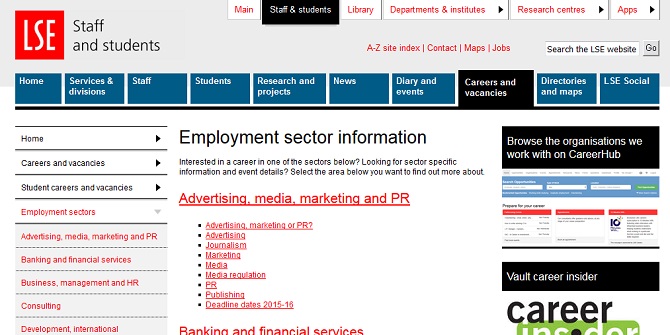What do you need to prepare?

Interviewing for academic jobs was discussed a PhD careers seminar and invaluable advice given by Dr Sam Friedman and Dr Jenevieve Mannell. Sam presented a reassuring and honest description of his career progression to Assistant Professor in Sociology at LSE (following his PhD at Edinburgh, a Fellowship at York and a short spell at City University) and Jenevieve shared the learning she gained through the experience of securing her Lecturer post in Global Health at UCL (following her PhD and Fellowship at LSE).
The comments and reflections provided by these inspiring role models are used in this blog to help with your academic career progression.
1. Selection processes

These vary by institution, department and over time so check you know what is going to happen and ask if anything is unclear. Find out in advance who is involved in selection and do some research into them and their work as you might be able to flatter them subtly by using some of this information on interview day. On the day you can expect to be asked to participate in some or all of the following:
- visit or tour
- presentation
- panel interview
- one-to-ones or informal chats
- dinner with future colleagues and/or other candidates
2. Preparing
The panel will already have your written application, writing samples and any pre-interview tasks. They might not recall much of the information you have already provided. Your job on the day is to remind them why they shortlisted you and bring to life everything you have already told them, with some more detail and flavour. So in preparation, refresh what you want the panel to know about your:
- motivation for this post
- relevance for this department; at this university (needs accurate knowledge)
- research interests and experience (past and future)
- teaching experience (past and future)
- service (department, discipline, field) and public engagement
3. The presentation or job talk
The requirements for these vary and might, for example invite you to: present your research; present a paper; give a lecture; present a course you could teach here; present your research as if teaching an undergraduate course; or variations /combinations on all these themes. Whatever the topic, this is your chance to demonstrate in action your capability to be a good colleague. The audience size can vary from three to 30 and not everyone will be an expert in your field. Don’t be too specific or precise about your research; situate your work in a wider discipline context showing your understanding of the wider themes of your field. Every department cares about student satisfaction scores so show you are a safe pair of hands in front of an audience. Expect questions about your talk, some might be aggressive, but again use this to show you are calm under pressure, always polite and genuinely interested in all the questions.
4. On being a colleague
Your professional identity matters and demonstrating your capacity to be a good colleague can be achieved in subtle ways; for example, by already being known to one or more of the selection panel. It helps. Every opportunity you take to meet potential colleagues adds to securing your place in the running. Through conferences, meetings, by joining academic associations; reviewing for a journal or by organising discipline related events, you can become better known to people in your field. Every time you show interest in others and their work you increase your chances of success at interview. The selection process is like the finale, confirming the place you have already started to hold in the academic community. Start early.
5. Your decision
You have done all you can to influence the panel’s decision but after the role is offered, you have a decision to make too. The early stages of an academic career are rarely straightforward. There is often a period of turbulence after your PhD as you find your niche in the field. Some decisions are career defining – what type of institution; type of role; freedom to develop your own work; what and when to publish; how long to stay in each post. Other decisions affect your personal life, and are equally life defining. Acknowledging the factors influencing your decision will help you think about accepting an offer, or not. The tone you take at this stage will lay foundations for your future professional relationships and we suggest you take care and get this right. In some cases negotiations can be made over job role, volume of work, starting salary and start date – but always wait until the offer is made before raising these issues.
Looking for more inspiration?
Take a look at our blog, PhD students you CAN work in academia! by Katsuhiko (Katsu) Yoshikawa (PhD LSE, Department of Management) who shares his story about getting an academic job during his PhD and makes some suggestions for people eager to make their life in academia.
The slides from a seminar on academic interviews are on the LSE Careers website, with lots of detailed information.
Another one of our blogs – Applying for a job in academia? You’ll need a specific type of CV – covers that part of the application process. There are also examples of CVs and cover letters on the LSE Careers website.
If you need to start by finding vacancies jobs.ac.uk has a good range of academic posts in UK, Europe, Australasia, Africa, America and the Middle East.
You’re not alone
LSE Careers is here to help: our events continue throughout the year and include a range of speakers and topics. You’ll meet peers from other departments with career concerns too.
A discussion with a Careers Consultant can help you make sense of all this, whatever stage you’re at in your PhD or early research career. Confidential one-to-one careers consultations are available every week. Book an appointment with me now. I look forward to working with you.
Catherine Reynolds






3 Comments